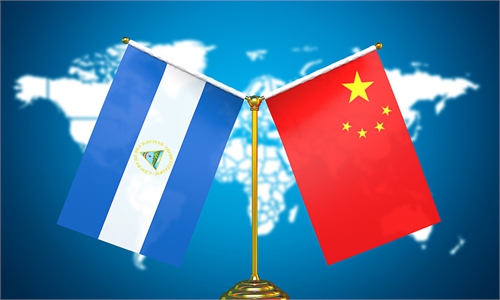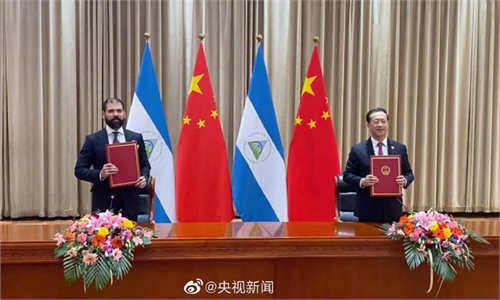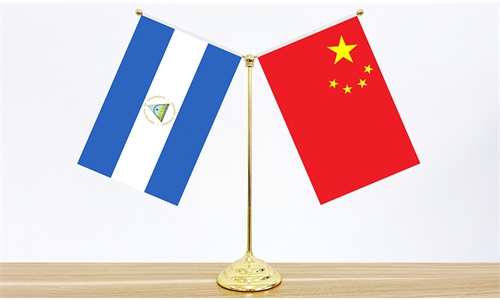
Fruits are on display at the Food and Agricultural Products Exhibition Area of the 4th China International Import Expo (CIIE) in east China's Shanghai, Nov. 6, 2021.Photo:Xinhua
As China and Nicaragua announced the resumption of diplomatic relations on Friday, trade has become the next topic which is of great potential not only between China and Nicaragua, but also between China and other countries in the Caribbean, with more trade opportunities set to be unleashed.
Unlike Taiwan's money-spending diplomacy which goes to consortiums which may not be able to directly deliver to improve local economies, Chinese analysts said that China's investment and funding to countries like Nicaragua would contribute to the development of the local economy and the expansion of its trade market.
Chinese observers even said Nicaragua will benefit from the opportunity to take part in the Belt and Road Initiative (BRI), providing a pathway to improve and develop domestic infrastructure for local people.
"Nicaragua's decision to resume diplomatic relations with China was based on its recognition of the one-China principle. It was a political decision without any economic prerequisites," Chinese Foreign Ministry spokesperson Wang Wenbin said on Friday.
Regarding several countries that still maintain "diplomatic relations" with Taiwan, Wang said that this is Taiwan's large-scale money-spending "diplomacy," regardless of the well-being of the Taiwan people.
China is willing to promote trade, expand investment and infrastructure cooperation with Nicaragua under BRI as the lead, and welcome Nicaragua in activities such as the China International Import Expo, China International Investment and Trade Fair, and China-Latin America Infrastructure Cooperation Forum next year, Yu Jianhua, Vice Minister of Ministry of Commerce who is also deputy international trade negotiations representative, said on Friday.
Nicaragua said it will expand bilateral cooperation in infrastructure construction, agriculture and fisheries, mining, clean energy, and digital economy and help Chinese companies explore the Central American market.
Nicaragua is the eighth country to sever ties with the island of Taiwan since the DPP's Tsai Ing-wen became Taiwan leader in 2016. There are only 14 countries which maintain "diplomatic ties" with the island.
Earlier in 2007, Costa Rica became the first Central American country to establish diplomatic relations with China in the new century. Former President Óscar Arias Sánchez, who facilitated the establishment of diplomatic relations between China and Costa Rica, firmly believes that establishing diplomatic relations with China was an extremely correct choice.
Four years later in 2011, the China-Costa Rica free trade agreement officially took effect with Costa Rica becoming the first Central American country to sign a free trade agreement with China, and it is also the third Latin American country to sign a free trade agreement with China following Chile and Peru.
Trade has increased every year. Between 2007 and 2020, Costa Rica's exports to China increased nearly four times, and China has consolidated its position as the nation's second largest trading partner.
Costa Rica is not alone. China's Ambassador to El Salvador Ou Jianhong said in August that China has committed to assisting in the construction of a number of large-scale social projects in El Salvador, such as docks, cultural infrastructure and education, sports, and drinking water.
Following the outbreak of the pandemic, China was the first country to provide medical support to the country, including masks and ventilators.
Such moves came after the governments of China and El Salvador signed a joint communiqué on establishing diplomatic relations in August 2018.
According to Chinese statistics, trade between the two countries in 2020 reached $1.11 billion, of which El Salvador's exports to China are $172 million, an increase of 51.6 percent over the previous year.
In June 2017, China and Panama signed a communiqué, which also injected vitality into the local economy.
In 2016, bilateral trade was at $6.38 billion, but this jumped to $9.25 billion in 2020, an increase of 10.1 percent year-on-year, with China primarily exporting mineral fuels and electronic products, and importing logs and copper.
Trade cooperation can be regarded as the ballast of the relationship between the two countries, for without economic cooperation, the relationship between the two countries will not be stable, market watchers said.
The "diplomatic ties" established by Taiwan island and its allies are chiefly based on financial aid, but their trade was generally very weak, and that is what the people really need, Wang Yong, a professor from Xiamen University, told the Global Times on Friday.
The island's other allies may be encouraged by Nicaragua to resume diplomatic ties with China, knowing that establishing diplomatic relations with China helps countries develop their economies and diversify their trading structures, creating more local job opportunities, said Wang.
In the first half of this year, trade between China and Latin America and the Caribbean reached $203 billion, up 45.6 percent, official data from Customs showed.
Wang said that China has the ability to provide more diversified support to countries like Nicaragua with complementary technologies to further boost the development of its agricultural development, and Nicaragua will benefit from the BRI in terms of infrastructure investment and support, while also unlocking new opportunities for economic growth.



